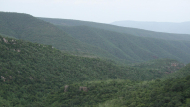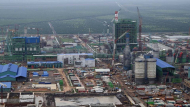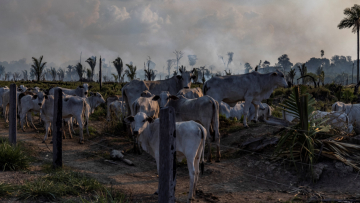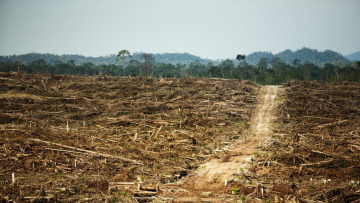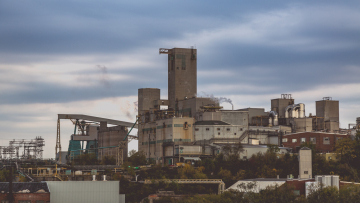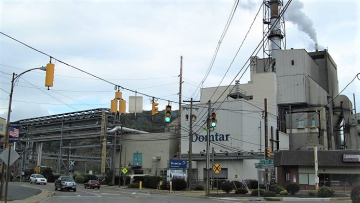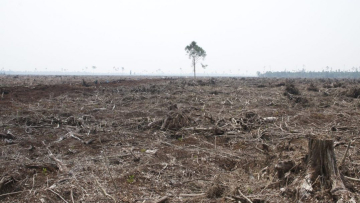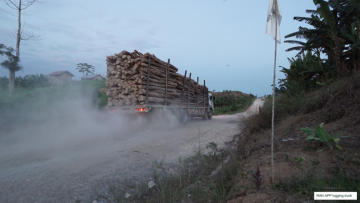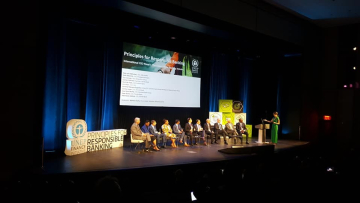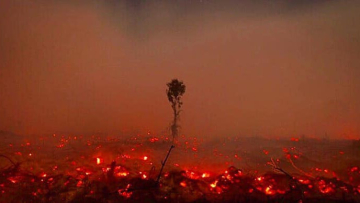Company – On record
This profile is no longer actively maintained, with the information now possibly out of datenature@banktrack.org
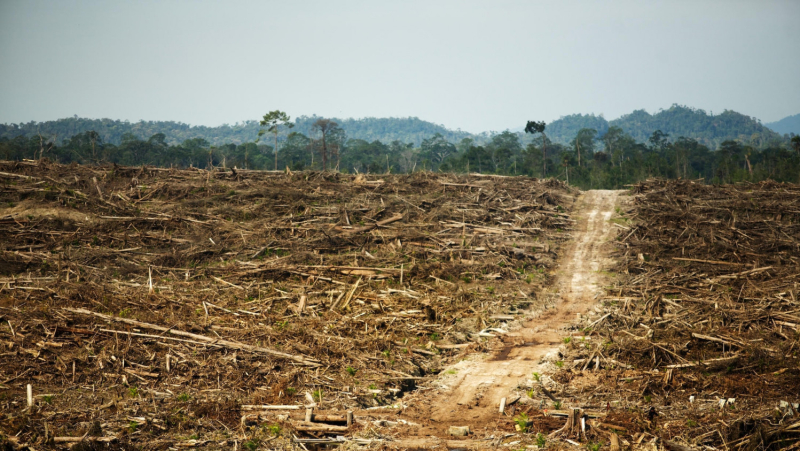
Company – On record
This profile is no longer actively maintained, with the information now possibly out of datenature@banktrack.org
Why this profile?
Asia Pulp and Paper has been long associated with massive deforestation, human rights abuses, harassment of local communities and colossal greenhouse gas emissions. APP is able to obscure such links by being part of a vast, complicated network of companies with an opaque corporate structure. Such a structure makes it easier to hide information that would be detrimental to APP, such as its deforestation record.
What must happen
Banks and other financial institutions should divest from and not provide any new financing for APP, its brands and/or affiliated companies, until it has been proven and verified that business operations have changed in a meaningful way. Buyers and investors should avoid products linked to APP, Sinar Mas, and Paper Excellence, as well as any Widjaja-owned sister companies.
| Sectors | Pulp, Paper and Paperboard Mills |
| Headquarters |
|
| Ownership |
APP is part of the Sinar Mas Group. This large Indonesian conglomerate was founded in 1938 by Eka Tjipta Widjaja and it has remained a family business since his death in 2019. |
| Subsidiaries |
Ekamas Fortuna – Indonesia
Lontar Papyrus Pulp & Paper Industry – Indonesia Paper Excellence – Canada Pindo Deli Pulp & Paper Mills – Indonesia Power Construction Corporation of China – China Tjiwi Kimia Paper Factory – Indonesia Univenus – Indonesia |
| Website | https://asiapulppaper.com/ |
Asia Pulp and Paper (APP) is the pulp and paper subsidiary of the Sinar Mas Group, which is one of the largest conglomerates in Indonesia. Sinar Mas mainly operates in the pulp and paper and palm oil sectors, but also has operations in real estate, financial services, agribusiness, healthcare, telecommunications and mining. One of the largest pulp and paper companies in the world, APP trades in 150 countries across six continents. APP products include textiles, stationery, printing and graphics papers, tissue, paper towels, shopping bags and packaging. The company is indirectly related to Canada’s paper conglomerate Paper Excellence; both are owned by the billionaire Widjaja family, who founded and own Sinar Mas.
Impact on human rights and communities
Land conflicts and the displacement of communities have long been consequences of APP’s operations and expansion. Some of these conflicts have been managed with brutal violence, such as the deliberate destruction by police of an estimated 300 homes in the Sumatran village of Suluk Bongkal. This 2008 raid also claimed the lives of two children. In 2021, the village was once again targeted by security forces. Thirty villagers were violently removed from land that was grabbed for a eucalyptus plantation.
In February 2013, after widespread public criticism of the company, community opposition and pressure from customers and investors, APP released a Forest Conservation Policy. The policy set out how APP intended to remedy its legacy of destruction and conflict by establishing a full inventory of its many community disputes, reforming its practices and developing action plans. An independent Rainforest Alliance evaluation of these policies followed in February 2015, which concluded that APP had only made “moderate” progress towards these goals.
The 2019 “Conflict Plantations” report by a coalition of Indonesian organisations and the Environmental Paper Network found APP to be involved in hundreds of conflicts with communities across Sumatra and Kalimantan. In just five Indonesian provinces (Riau, Jambi, South Sumatra and both West and East Kalimantan), at least 107 villages or communities were in active conflict with APP affiliates or its suppliers. These conflicts included disputes about customary lands, livelihoods, subsistence crops, evictions, compensation and the lack of Free, Prior and Informed Consent (FPIC) for the development of pulp plantations. Furthermore, 544 villages were identified as sites of potential conflict, representing more than 2.5 million hectares of land; this equates to between USD 5.7 and 7.7 billion in social compensation risk.
The Rainforest Alliance received a submission about APP from a coalition of NGOs in 2019 that concluded the company had failed to involve key stakeholders in the identification, analysis and resolution of its social responsibility conflicts.
Child labour was discovered in APP’s supply chain in 2013. The Indonesian authorities discovered eight children aged between 16 and 18 working for Arara Abadi (Sinar Mas Forestry) in Sumatra’s Kerumutan forest.
Environmental activists have faced violence, intimidation and death as a result of APP-related conflicts. In March 2015, a farmer and activist named Indra Kailani was tortured and killed by security personnel in Jambi, Indonesia. These forces were employed by PT. Wirakarya Sakti, an APP-controlled supplier.
In 2020, villagers in Jambi accused the APP affiliate PT. Wirakarya Sakti of spraying herbicide from drones to remove evidence of land cultivation by local communities. Wirakarya Sakti also brought in security staff who shot into the air to intimidate villagers during data collection visits; Strategic Lawsuits Against Public Participation (SLAPPs) were used to silence the local community. During the same year, the APP-controlled company PT Arara Abadi silenced a protestor from Indonesia’s Riau province using the courts: A 58-year-old farmer from the Sakai Indigenous tribe named Bongku was imprisoned and fined USD 13,800 (around 70 months' wages) for planting sweet potato on his customary land, which Arara Abadi claimed as its own.
A public health crisis was triggered by fires set in 2015, which was traced back to companies including APP. The resulting smoke and haze affected the entirety of Southeast Asia, with national emergencies spreading from Indonesia to Singapore, Malaysia and beyond. Nineteen people died and an estimated 500,000 cases of respiratory tract infections were reported at the time. It is estimated that the fires led to more than 100,000 premature deaths in the region: A 2015 public health study estimated 91,600 premature deaths from exposure to fine particle pollution in Indonesia, 6,500 in Malaysia and 2,200 in Singapore. The cost of the fires was estimated to be USD 16 billion, equivalent to 1.9% of Indonesia’s gross domestic product.
Impact on climate
The mass clearing of peatlands by APP releases large amounts of carbon into earth’s atmosphere. Peatland is the most efficient carbon sink on the planet and therefore critically important for mitigating climate change. In 2017, it was estimated that 50 billion tonnes of carbon are held in Indonesia’s peat bogs. Indonesia’s pulp and paper industry has extensive tree plantations on drained and dried peatlands, including approximately 50% of APP's pulpwood suppliers. Draining and drying peatland causes oxidation and increases flammability, both of which lead to high levels of greenhouse gas emissions. Between August 2018 and June 2020, APP actively cleared 3,500 hectares of Sumatran peatland and dug 53 kilometres of drainage canals. These activities directly breached APP’s own commitments to preserve and restore carbon-rich ecosystems and reduce its emissions.
The Intergovernmental Panel on Climate Change (IPCC) suggests that, per hectare, a drained peatland growing acacia trees will emit approximately 70 tonnes of CO2 annually. Indonesia’s pulp plantations on peat soil therefore emit more than 80 million tonnes of CO2 annually, of which APP is responsible for 44 million tonnes.
Massive greenhouse gas emissions occurred during Indonesia’s 2015 fire and haze crisis, for which APP was identified as one of the top companies responsible. It was caused by the burning of 2.6 million hectares of plantations, forests and peatlands throughout Sumatra, Kalimantan and Papua. According to the Global Fire Emissions Database, an estimated 1.75 billion tonnes of carbon dioxide equivalent was released in just a few months, which is more than Germany's or Japan’s total annual emissions. Daily emissions during the fires’ peak weeks exceeded the daily fossil fuel emissions of the USA’s entire economy.
The 2019 Indonesian forest fires emitted at least 708 million tonnes of greenhouse gases into the atmosphere. This figure is almost double the emissions of the Amazon’s 2019 fire season. Many of those fires emerged in pulpwood plantations and six of the biggest culprits supply APP.
Impact on nature and environment
Extensive clearing of natural forests and peatlands have long been hallmarks of APP’s operations. To address this, APP released a Forest Conservation Policy (FCP) in 2013. The policy commitments include engaging with local communities and halting all natural forest destruction in Indonesia, extended to all its suppliers. APP also committed to protecting High Conservation Value (HCV) areas and High Carbon Stock (HCS) forests, as well as to recognising Indigenous and local land rights. The FCP was cautiously welcomed by organisations including Greenpeace, WWF and the Rainforest Action Network, although it was also noted that much of APP’s forest land was already cleared.
Not only has APP failed to stick to the FCP commitments it made in 2013, but the company has intensified its illegal encroachment and intimidation of target villages. In 2018, Greenpeace reported that almost 8,000 hectares of forest and peatland linked through ownership to APP and Sinar Mas Group had been cleared since 2013. In 2019, a group including WWF reported that APP was sourcing wood from deforestation-linked plantation companies such as PT Fajar Surya Swadaya; this East Kalimantan company cleared nearly 20,000 hectares of natural forest between 2013 and 2019. In 2019, APP acknowledged ownership and supply chain linkages with problematic companies previously described as “independent”. A June 2020 Greenpeace report showed evidence of APP and its linked companies clearing 3,500 hectares of peatland between 2018 and 2020. An August 2022 Eyes on the Forest report provided evidence of APP’s PT Arara Abadi subsidiary clearing natural vegetation for acacia seedlings in HCV 1 areas, incorporating Sumatran elephant habitat and a UNESCO reserve.
The Forest Stewardship Council (FSC) disassociated from APP in 2007 “because of substantial, publicly available information that APP was involved in destructive forestry practices and was thus in violation of the Policy for Association.” APP later expressed its interest in rejoining, but the FSC suspended this process in 2018 due to allegations of unacceptable forest management activities. As of November 2021, APP remained disassociated from the FSC amid concerns regarding deforestation, destruction of HCVs, rights violations and illegal trading.
Other impacts
Financial mismanagement and huge debts are long-standing issues for APP and its subsidiaries. Creditors allege that APP has pursued a variety of tactics to delay and/or avoid repaying its debts: APP traded over USD 1 billion in debts through companies registered in the British Virgin islands; the company failed to announce losses of USD 220 million in two currency swaps that were initially unreported, which forced a reissue of APP’s financial statements; and APP allegedly used employees as bondholders to vote on a debt restructuring decision.
In 2001, APP defaulted on approximately USD 13.9 billion in loans, with some of its creditors only receiving a small fraction of their original investments. APP subsidiary Paper Excellence’s Northern Pulp mill was declared insolvent after petitioning for financial aid in June 2020, therefore avoiding the repayment of loans worth more than USD 85 million to the province of Nova Scotia. Paper Excellence also claimed that Northern Pulp owed it USD 213 million in debt.
The financial institutions below have arranged corporate loans, revolving credit facilities, bond and share issuances and shareholding services for Sinar Mas, of which Asia Pulp and Paper (APP) is a subsidiary.
In July 2021, APP’s sister company Paper Excellence “and its subsidiaries” secured financing worth an aggregate USD 1.95 billion through Barclays, Credit Suisse and Bank of Montreal. Paper Excellence then acquired its competitor Domtar for approximately USD 3 billion in December 2021; Barclays served as exclusive financial advisor.
In 2007, Forest Stewardship Council (FSC) had “dissociated” itself from APP, citing “substantial publicly available information that suggests that APP is associated with destructive forestry practices.”
On August 16, after opening to design a roadmap to end its disassociation with APP, FSC announced its decision to suspend the process it had started in early 2017 and awaits “further information from APP related to its corporate structure and alleged unacceptable forest management activities by companies thought to be related to APP”.
Applicable norms and standards
Four investigations into APP pulpwood suppliers are under way in Singapore under the Transboundary Haze Pollution Action (THPA). Indonesian governmental regulations indicate that in order to prevent fires, peat must be protected and restored. APP already had problems of legal compliance on this, and is likely to have more in the future due to its expansion plans.
WEBINAR on APP
The Ramin Paper Trail
Asia Pulp & Paper 2010
2024
2024-08-29 00:00:00 | South Sumatran residents sue APP subsidiaries over peatland smoke haze
On August 29, residents in South Sumatra, Indonesia, took three subsidiaries of Asia Pulp & Paper (APP) to court over the chronic smoke haze. Their pulpwood concessions are accused of repeatedly causing haze pollution due to fires on their concessions during the dry seasons. The lawsuit was filed by twelve residents at Palembang District Court against three plantation companies—PT Bumi Mekar Hijau (BMH), PT Bumi Andalas Permai (BAP), and PT Sebangun Bumi Andalas Wood Industries—over repeated peatland fires causing severe haze. Backed by the South Sumatra Smoke Suit Initiative (ISSPA), they seek compensation for the loss of a healthy environment and demand environmental restoration due to the harm caused by the fires. The community is demanding absolute liability or ‘strict liability’ from legal entities for losses due to pollution or environmental damage committed by these legal entities.
The lawsuit alleges the companies are responsible for smoke haze that has harmed the environment and public health. Plaintiffs experienced health issues like chest tightness and respiratory problems, and disruptions to daily activities such as farming, fishing, and work. They also faced financial losses due to increased costs and decreased productivity, along with disruptions to schooling, worship, and social interactions, leading to anxiety and depression.
Indonesia’s pulp and paper industry has extensive tree plantations on drained peatlands, which are exceptionally high source of greenhouse gas (GHG) emissions through its oxidation (up to 80 tonnes CO2 per hectare per year). When drained, it provides large extensions of fuel that make fires uncontrollable. As peatland burns with low oxygen levels, it leads to thick haze formation. Consequently, the development of large- scale pulpwood plantations has become the major driver of fires and led to haze episodes of disastrous proportions.
2023
2023-03-01 00:00:00 | Paper Excellence and APP deeply connected
Two separate research publications show the deep connection between Paper Excellence and Asia Pulp and Paper (APP). The publications demonstrate that the two groups are not just only related by shareholders from the same family, but are intertwined and have connections from top to bottom and operate under a common strategy. An APP whistleblower said "We were basically strategically looking after the interests of both companies (...) I was told that everything we're doing has to stay within us." This is crucial as the distinction between Paper Excellence and APP has helped Paper Excellence's growth. Paper Excellence is able to obtain FSC certification and financing from banks, which both would not have been possible if it was integrated by APP.
2022
2022-07-06 00:00:00 | Paper Excellence to buy North America’s Resolute Forest Products
Paper Excellence, through its subsidiary Domtar, has agreed to buy Resolute Forest Products. Paper Excellence and Domtar are associate companies of APP. The deal is expected to close in the first half of 2023, with Barclays advising Paper Excellence and CIBC Capital advising Resolute.
2021
2021-12-13 00:00:00 | NGOs reveal significant material risk to banks and investors exposed to APRIL and APP
New analyses by the Environmental Paper Network, Forest & Finance and BankTrack reveal significant material risk to banks and investors exposed to two fo the world’s largest pulp and paper companies - Asia Pulp & Paper (APP) and Asia Pactific Resources International (APRIL).
2021-07-29 00:00:00 | Indonesian paper giant APP acquires North America’s Domtar
Domtar shareholders have decided to sell to Canada’s Paper Excellence, which is associated with Asia Pulp and Paper (APP). Domtar is a major North American uncoated freesheet paper producer with 21 manufacturing facilities around the world, 6,400 employees and customers in 50 countries.
2020
2020-07-23 00:00:00 | Environmental Paper Network responds to APP’s misconduct denials
In response to Asia Pulp and Paper’s (APP) denials of communities’ rights violations in Indonesia, the Environmental Paper Network has published a chronology of the company’s misconduct between 2007 and 2020. The chronology includes examples of intimidation, criminalisation and episodes of violence.
2020-05-15 00:00:00 | Ninety NGOs pen open letter to APP’s investors and buyers
Local and international organisations including BankTrack, Friends of the Earth, Urgewald, Eyes on the Forest and WALHI have sent an open letter to APP’s buyers and investors. The letter urges action against APP’s continuing violation of communities’ rights in Indonesia.
2018
2018-08-16 00:00:00 | FSC suspends APP’s reassociation process
After embarking on a roadmap to end its disassociation with APP in early 2017, the Forest Stewardship Council (FSC) has announced its decision to suspend the process. The FSC is awaiting “further information from APP related to its corporate structure and alleged unacceptable forest management activities by companies thought to be related to APP”.
2018-05-16 00:00:00 | Greenpeace ends engagement with APP and Sinar Mas
Greenpeace has ended its longstanding engagement with APP, following a new mapping analysis that found almost 8,000 hectares of forest and peatland has been cleared since 2013. This has occurred in two concessions linked to APP and its parent company, the Sinar Mas Group. Greenpeace International put these allegations to APP/Sinar Mas, but the group failed to provide a credible response or to take meaningful action.
2017
2017-11-15 00:00:00 | NGOs publish Performance Verification Criteria and Indicators
A group of NGOs has published an evaluation of the Environmental, Social and Corporate Governance performance of Sinar Mas Group (SMG) and Royal Golden Eagle (RGE). The document provides a clear framework that companies and other stakeholders can follow to measure performance requirements and independently verify SMG’s and RGE’s on-the-ground performance. It should prove critical in the Forest Stewardship Council’s decision regarding its reassociation with Asia Pulp and Paper. Groups that worked on the document include the Hutan Kita Institute, Jikalahari, KKI Warsi, the Rainforest Action Network, Titian, Walhi Riau and Walhi Jambi and WWF Indonesia.
2016
2016-04-30 00:00:00 | APP threatens its zero deforestation commitment with South Sumatran pulp mill
A coalition of 12 NGOs has revealed that Asia Pulp and Paper (APP) is building one of the world's largest pulp mills in the Indonesian province of South Sumatran. The USD 2.6 billion OKI Pulp and Paper Mills project does not have a sustainable wood supply, which contravene APP’s own zero deforestation policy. The project will expand APP's wood demand by over 50%, much of it sourced from plantations on high-carbon peatlands.
2015
2015-10-06 00:00:00 | NGOs send letter of concern to APP director Linda Wijaya
A group of NGOs has sent a letter to Asia Pulp and Paper Director Linda Wijaya, following a stakeholder engagement forum in Jakarta on 5th October. At the forum, APP presented information on how it is attempting to implement its Forest Conservation Policy and associated plans. The letter raises issues over what the NGOs see as APP’s lacklustre efforts to reform its structures and practices.
2007
2007-10-31 00:00:00 | APP dissociated by Forest Stewardship Council
The Forest Stewardship Council (FSC) has announced its dissociation with APP, citing “substantial publicly available information that suggests that APP is associated with destructive forestry practices.”

